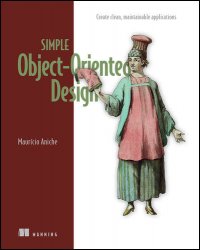Simple Object Oriented Design: Create Clean, Maintainable Applications (Final)
- Добавил: literator
- Дата: 14-05-2024, 12:39
- Комментариев: 0
 Название: Simple Object Oriented Design: Create Clean, Maintainable Applications (Final)
Название: Simple Object Oriented Design: Create Clean, Maintainable Applications (Final)Автор: Mauricio Aniche
Издательство: Manning Publications
Год: 2024
Страниц: 316
Язык: английский
Формат: pdf, epub
Размер: 10.1 MB
Write object-oriented code that’s manageable, maintainable, and future-proof.
Keeping your object-oriented designs simple demands a creative approach—and that’s exactly what you’ll find in Simple Object-Oriented Design. This book is full of patterns and principles for reducing complexity, each one proven in author Mauricio Aniche’s 20-year career in software development. You’ll learn how to tackle code’s natural growth in complexity, and adopt a “good enough” approach that means it’s easy to refactor when requirements change.
You’ll discover insightful principles for:
Making code readable and documented
Improving consistency and encapsulation
Managing dependencies
Designing abstractions
Handling infrastructure
Effective modularization
Learn what constitutes both good and bad object-oriented software design, discover how to make better trade-offs in design decisions, and when to embrace complexity over simpler data structures. With this book as your vital reference, you’ll be ready to write code that will last the test of time, without slowing feature delivery to a crawl.
This book delves into object-oriented design from two specific angles: how to prevent the complexity of a system from skyrocketing and how to achieve “good-enough” designs. First, most of a developer’s work revolves around maintaining and evolving existing systems. Unfortunately, without due care, every time you make changes to a software system, it becomes more complex, even if it is well designed from the outset. Therefore, this book greatly emphasizes how to combat the natural growth in complexity. Second, more often than not, you initially have limited knowledge about what you’re building. Despite your best efforts, your first design may fall short. However, that’s acceptable if you arrive at a good-enough design. The purpose of this book is not to lead you to always achieve the absolute best possible design, but to enable you to create good designs that empower you to build software effectively.
about the technology
Even a simple object-oriented application can quickly become complex as it evolves. Each new class, method, or feature means more state and abstractions to manage, which in turn increases complexity, maintenance, and time spent detangling legacy code. It takes effort and skill to keep your codebase simple. This book shows you how.
about the book
Simple Object-Oriented Design: Create clean, maintainable applications presents practical design principles you can use to keep an object-oriented codebase simple as it grows and changes. Written as a collection of practical techniques you can apply in any OO language, it offers tips for concise code, managing dependencies and modules, and designing flexible abstractions. Illuminating figures, real-world examples, and insightful exercises make each principle stick.
what's inside
Writing simple, understandable classes
Flexible abstractions to extend your designs
Reducing the impact of coupling
about the reader
Readers should be familiar with an object-oriented language like Java, C#, or Python.
Скачать Simple Object Oriented Design: Create Clean, Maintainable Applications
Внимание
Уважаемый посетитель, Вы зашли на сайт как незарегистрированный пользователь.
Мы рекомендуем Вам зарегистрироваться либо войти на сайт под своим именем.
Уважаемый посетитель, Вы зашли на сайт как незарегистрированный пользователь.
Мы рекомендуем Вам зарегистрироваться либо войти на сайт под своим именем.
Информация
Посетители, находящиеся в группе Гости, не могут оставлять комментарии к данной публикации.
Посетители, находящиеся в группе Гости, не могут оставлять комментарии к данной публикации.
